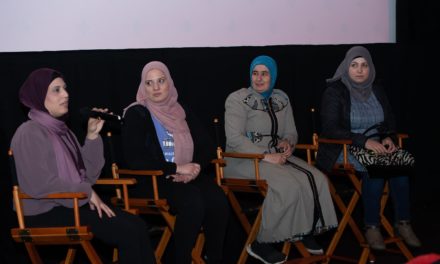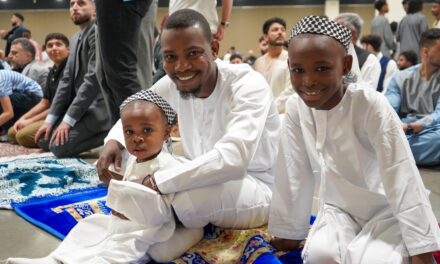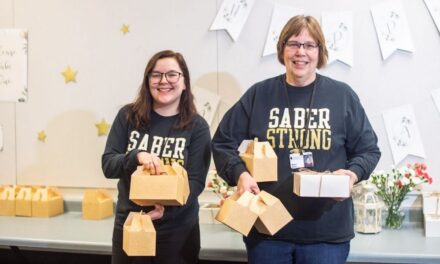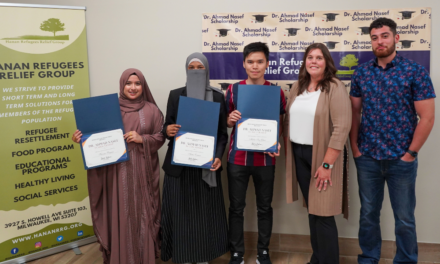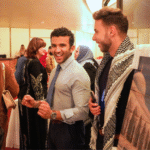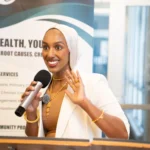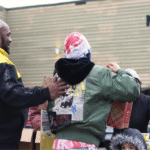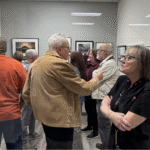
Enthusiasm is building as Muslim Women’s Coalition prepares to celebrate its 15th Annual Gala at Marcus Performing Arts Center at 929 N. Water Street.
The 15th annual Muslim Women’s Coalition Gala will celebrate the organization’s support from the Muslim community and beyond, said MWC board president Aishah Aslam, D.O., a cardiologist at Ascension Saint Agnes Hospital in Baltimore, who will come to Milwaukee to join in the fun.
“Everybody shows up,” Dr. Aslam said in a Zoom interview with the Wisconsin Muslim Journal. “Muslims from every masjid and Muslim organization in Greater Milwaukee, the Milwaukee interfaith community, our allies like BLOC (Black Leaders Organizing for Communities), Jewish Voice for Peace, the Latin American and Sikh communities and others, and local, state and national politicians. The room includes every ethnicity and faith.
“It’s always so refreshing because it is rare to see such widespread support at any event. There’s such a lively spirit of connectedness, a feeling of rejuvenation and excitement to be working together as a larger community. You leave the gala with hope for our future.”
The 15th annual Muslim Women’s Coalition Gala: Catalysts for Change: Redefining Tomorrow begins at 5:30 p.m., Saturday, Dec. 6, at the Marcus Center for the Performing Arts, 929 North Water Street, Milwaukee. Purchase tickets here by Nov. 20.

This year’s gala features two keynote speakers, silent auction and an evening highlighting a year of inspiration and impact of the Muslim Women’s Coalition.
National Muslim leaders to deliver keynotes
Two national figures will deliver keynote speeches: racial justice and civil rights activist Linda Sarsour of New York and Ahmed Rehab, executive director of CAIR (Council on American-Islamic Relations) Chicago. Both speakers epitomize the essence of the Muslim Women’s Coalition, MWC founder and executive director Janan Najeeb told the Wisconsin Muslim Journal.
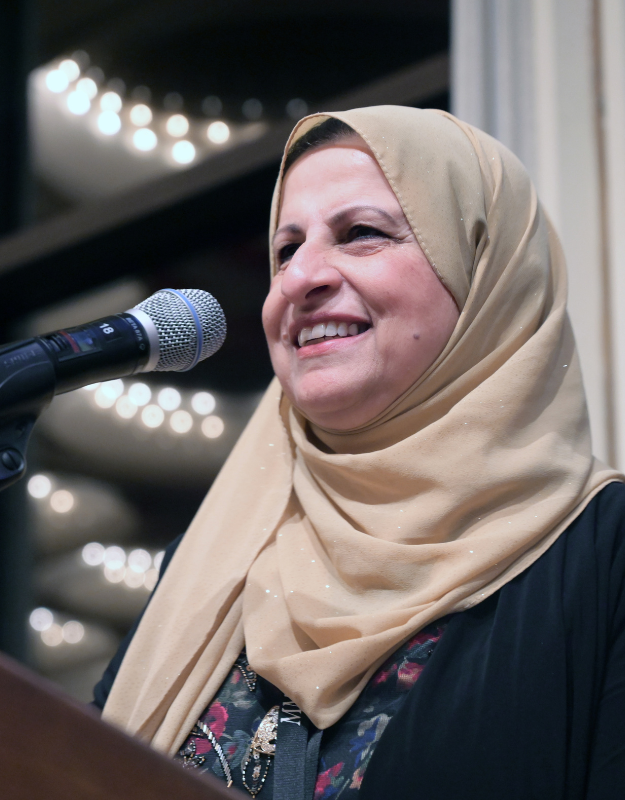
Janan Najeeb, founder and executive director of Muslim Women’s Coalition
“Linda highlights something central to the MWC—being proud to be Muslim,” Najeeb said. “She has been famously ‘unapologetically Muslim’ long before people jumped on that bandwagon. For Muslim women to be proud of their identity and transmit that pride into their schools, their workplaces and to their families and children is what we are all about.
“Ahmed Rehab works tirelessly against Islamophobia and efforts to marginalize Muslims,” she continued. “He is an outspoken advocate for Muslims. That’s who we are. That’s what we do.”
“Linda is obviously at the forefront of Muslim activism in the U.S.,” Aslam added. “Ahmed is someone who does a lot of work behind the scenes, helping organizations address discrimination.
“When Megan Markle’s organization withdrew its grant from our program for Afghan refugee women, he came to our aid and encouraged us to address it openly.
“We didn’t back down. We know our mission and our values; we’re not going to let external pressure keep us from doing what is right. The withdrawal of funding was a direct attack on free speech. Afterward, we gained so much more support. That was nice to see!”
MWC’s unique role
From its beginning 31 years ago as a gathering of women eager to promote a more accurate understanding of Islam and Muslims, through officially becoming a nonprofit organization 15 years ago, MWC’s mission has always been “to empower Muslim women and girls … helping them reach their fullest potential while creating a positive impact on the broader community.”

WMC Board President, Aishah Aslam, D.O.
“We are about working for positive change,” Najeeb said, “particularly in these past couple of years. With genocide in Gaza, horrors in Sudan, ICE raids here in the United States and the new administration dismantling our democracy, I think being tireless agents of change is critical.
“We have great organizations that run mosques and schools, and new organizations working specifically for Palestinian and other important causes. But we are really about transforming and empowering the Muslim community, and making sure the broader community includes us in spaces of decision-making.
“MWC starts things nobody else thought of doing—opening an Islamic library in Wisconsin, starting a Muslim film festival and newspaper, creating a culturally specific domestic violence and family strengthening program.
“Because we are not a mosque, we can be a big umbrella for Muslims and non-Muslims alike. Our interfaith book club and networking brunches are attended primarily by non-Muslims. That’s because we’re a safe and welcoming space to many groups that align with our mission of creating a better society that is just for all. Our work has always been in partnership and collaboration with the broader community.
“Many of our pioneering initiatives have taken legs on their own, like the Wisconsin Coalition for Justice in Palestine, which was started by the MWC and is now independent and includes over 90 organizations around the state.
“The same thing is true of the Wisconsin Muslim Civic Alliance, which mobilizes Muslims to be civically engaged. MWC started it and ran it, then allowed it to become independent.
“The gala is our single most important fundraiser and makes all of these initiatives possible. It brings in unrestricted funds that allows us to think big.”
Earning a solid reputation
The MWC is seen by public officials, the media, educational and other institutions, and the general public as “the” resource on Islam and Muslims in Wisconsin. For example, when Muslim refugees came from Afghanistan to Wisconsin, the U.S. military consulted with the MWC about how best to meet their needs.
“People come to us to find speakers on particular topics or to connect with resources in the Muslim community,” Najeeb said. “We’ve built the reputation as a trusted resource for media, educators, government and others that is immediately responsive. Honestly, we have worked hard to build our reputation and earned it because of our professionalism over 31 years.”

MWC Gala Keynote Speaker, Linda Sarsour, is a community organizer, author and award-winning racial justice activist. Co-founder of the first Muslim online organizing platform, MPOWER Change and former executive director of the Arab American Association of New York.

MWC Gala Keynote Speaker, Ahmed Rehab, is the executive director of the Council on American-Islamic Relations (CAIR)-Chicago and CAIR’s National Strategic Communications Director.
Aslam noted MWC’s leadership. “In difficult times like today, we often see beautiful moments of collective action. One of the things I’m proud of is that MWC always positions itself near the center of those actions, bringing our community to the table, working with partners, allies and friends in the community to make a path to a better future.
“I’m grateful donors are already confident in contributing to MWC. We have made a name in our community. We’ve established a solid reputation for being consistently there, not just in times of need, but in addressing multiple different issues for our community.
“We’ve built a broader community with partners, creating a network that empowers our whole community to be able to be more powerful during moments of crises.”
Managing rapid growth
MWC’s success brings its biggest challenge. Its professionalism has led to rapid growth and an increased demand for services.
“We have greatly outgrown our space,” Najeeb noted. “In 15 years, our staff has quadrupled, now with 13, many of whom are full-time.
“Our programs have grown immensely. In fact, we have many of our children’s programs fill within five minutes of registration opening. We are looking for a larger space so we can expand our programs and cut down the waiting lists. With more space, the sky’s the limit!”
MWC is actively looking to expand its physical footprint in a new space and is expected to launch a capital campaign in the coming year. “It’s a testament to the quality of our work and to the support we have received from the community,” Aslam said. “We’ve shown through our actions how powerful a community can become.”
That might just be what has drawn Aslam to stay engaged with MWC despite her move to Baltimore.
“I have this big dream,” she confessed. “I think MWC has the potential to go national and have chapters in multiple locations in the country. Even though there are other Muslim women’s organizations focused on women’s issues, there is no other force putting Muslim women’s ideas forward to impact the larger community and society like MWC.”
